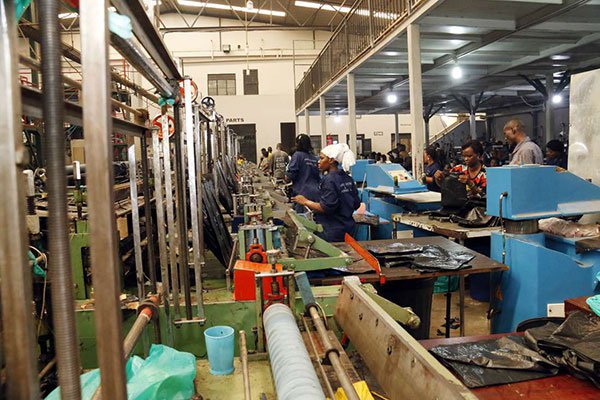Under the old policy, Uganda’s industry and manufacturing sector’s contribution to the GDP grew 18.5 per cent between 2008 and 2017, well below the targeted 30 per cent.
he proposed policy also seeks to review and strengthen the laws that promote industrial development such as the Industrial Licensing Act.
The government hopes that the new policy will increase these figures within a decade.
Uganda is drafting a new national policy to boost its industrial growth and cut its trade deficit.
According to government officials, the policy will be ready for Cabinet review in January next year
Under the old policy, Uganda’s industry and manufacturing sector’s contribution to the GDP grew 18.5 per cent between 2008 and 2017, well below the targeted 30 per cent.
According to the Ministry of Trade, Industry and Co-operatives, the country’s industrial development stood at 6.2 per cent of GDP in the financial year 2017/18 compared with 3.4 per cent in the year before.
The government hopes that the new policy will increase these figures within a decade.
Minister for Trade, Industry and Co-operatives Amelia Kyambade last week blamed the old policy’s shortcomings on the high cost of doing business in the country.
According to the World Bank, Uganda ranks behind East African counterparts Kenya and Rwanda in ease of doing business.
The government is banking on the Uganda Development Bank to support both local and foreign industries The Uganda Development Corporation as the government’s investment arm; and insurance schemes to safeguard industries will be established.The proposed policy also seeks to review and strengthen the laws that promote industrial development such as the Industrial Licensing Act, Investment Code Act and the East African Common External Tariff.The government also wants to increase funding to the industrial sector to promote skills among the labour force and support SMEs.“It’s time to put money into the industry so we can add value to the raw materials we have and export,” said Denis Ainebyoona, Assistant Commissioner of industry in the ministry of Trade, Industry and Co-operatives. Attracting investment Mr Ainebyoona said that with the new policy, the government will prioritise attracting investment to sectors with potential of creating jobs and reducing importation of certain products.The prioritisation will see value addition in agro processing, tea, coffee, fisheries, extractives, cosmetics, gold and iron and steel.“Globally, industrialisation has played a key role in the development of economies; and we think it is now time Uganda and Africa stepped up this,” […]
